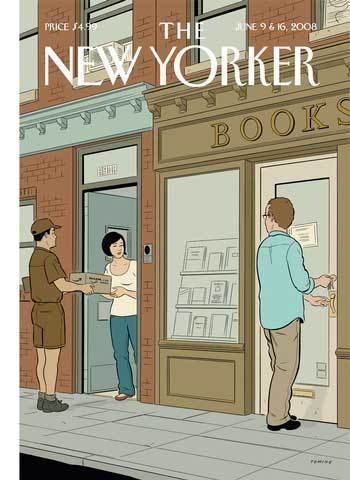At the forefront of this debate are the simple, quippy complaints that a book doesn't run out of batteries, or need software updates, but these are readily combated by the space and trees savings of e-readers. An e-reader can download a book in less than a minute right from your chair, but again this is offset by the loss of the bookstore browsing experience, for online bookstores are hardly a suitable replacement for wandering the narrow canyons of stacks seemingly formed by the countless footsteps of the wizened readers that came before. Nor are the slapdash reviews in online comments a replacement for the judicious advice of a kindly librarian.
I realize that my inherent distaste for e-books traces back to my elementary school years of ordering books from the Scholastic Book catalog and cherishing that wonderful new-book smell when they finally arrived. New books smell like my local bookstore and old books smell like nap-time at my grandmother's after school. E-books don't smell and the pages don't turn (regardless of animated imitations thereof). Now, I am by no means a technophobe, actually I'm more connected than most, but I do have my sentimental ties to some of the uncomplicated joys that still manage to pervade our technological world, such as hot tea or a wood-burning fire.
There is also a pride to owning books. I love my bookshelf; it is a roadmap of my literary education. Prominently displayed books become conversation starters for visitors in my home and create connections with people that I may not have known well up to that point. "Oh, have you read that? Did you like it? I heard that it... Wow! Did you read that series too? I used to love them as a kid! My favorite was... Did you ever read...?"
 |
| A portion of the books in Jenni and I's living room bookshelf |
Scientific and historical texts, however, frequently have notes that will refer the reader to more in-depth coverage of a topic or clarification of a citation. Another good example is of older novels such as The Picture of Dorian Gray by Oscar Wilde, which is so replete with contemporary 1880's references that it's likely no one has fully understood the text since the first few years after it was published. A typical copy comes with an extensive appendix which is referenced every page or so, in an attempt to clarify various phrases and cultural references that have long since fallen into obscurity.
 Pros and cons aside, e-books are undeniably on the upswing, which begs the question, will e-books become the dominant medium through which literature is enjoyed? Will e-readers replace books all together?
Pros and cons aside, e-books are undeniably on the upswing, which begs the question, will e-books become the dominant medium through which literature is enjoyed? Will e-readers replace books all together?The most compelling argument in favor of this idea is simply that, sentimental feelings aside, e-readers are superior to books. This is a fact. The newest models are inherently lighter and more space efficient than both a single hard-cover and an entire Borders store, and e-readers have ever-expanding features that bound paper simply can't. They are simple enough in design that anyone can use one and, consequently, they are not plagued with the downtime and system failures of a fully fledged computer (the iPad is a possible exception here, but has other benefits in its favor).
However, I suspect that e-readers are not better enough. A book is still damn good at being a book; it is portable, readily accessible, and way cheaper per hour of entertainment than a movie. A book and an e-reader are close enough to interchangeable that someone can easily just claim a difference of opinion as to which he or she prefers and not be looked at as stubbornly clinging to old technology.
Assuming current trends continue, e-readers will take a much larger percentage of the market in the future. The big change will likely be when all students have one e-reader for their entire education instead of a half-dozen textbooks for each semester. This will also make a big impact in combating the sentimental attachments of hold-outs like myself. The next generation will eagerly await their downloads from the new Scholastic e-book catalog and they won't even know the smell they're missing.



No comments:
Post a Comment